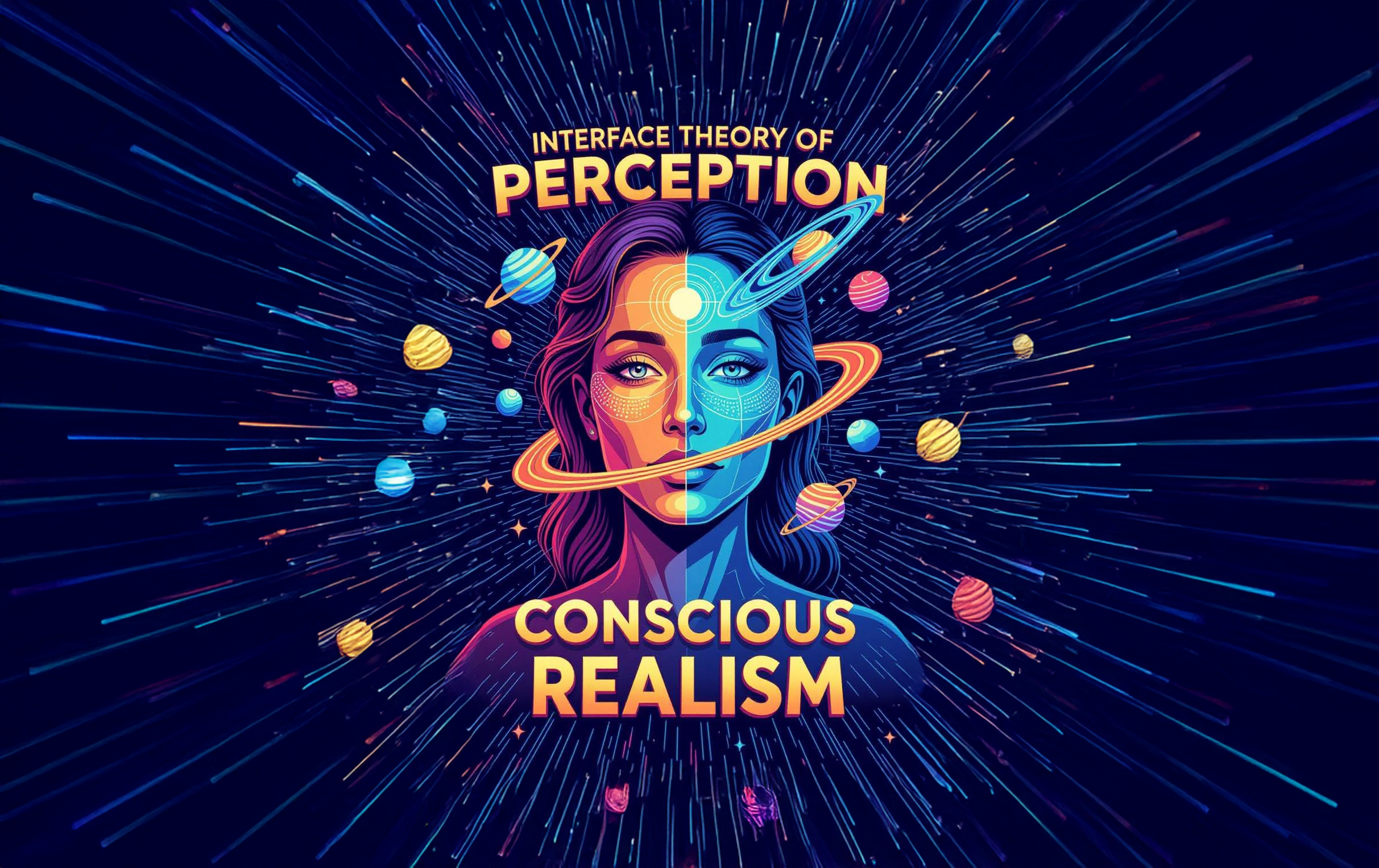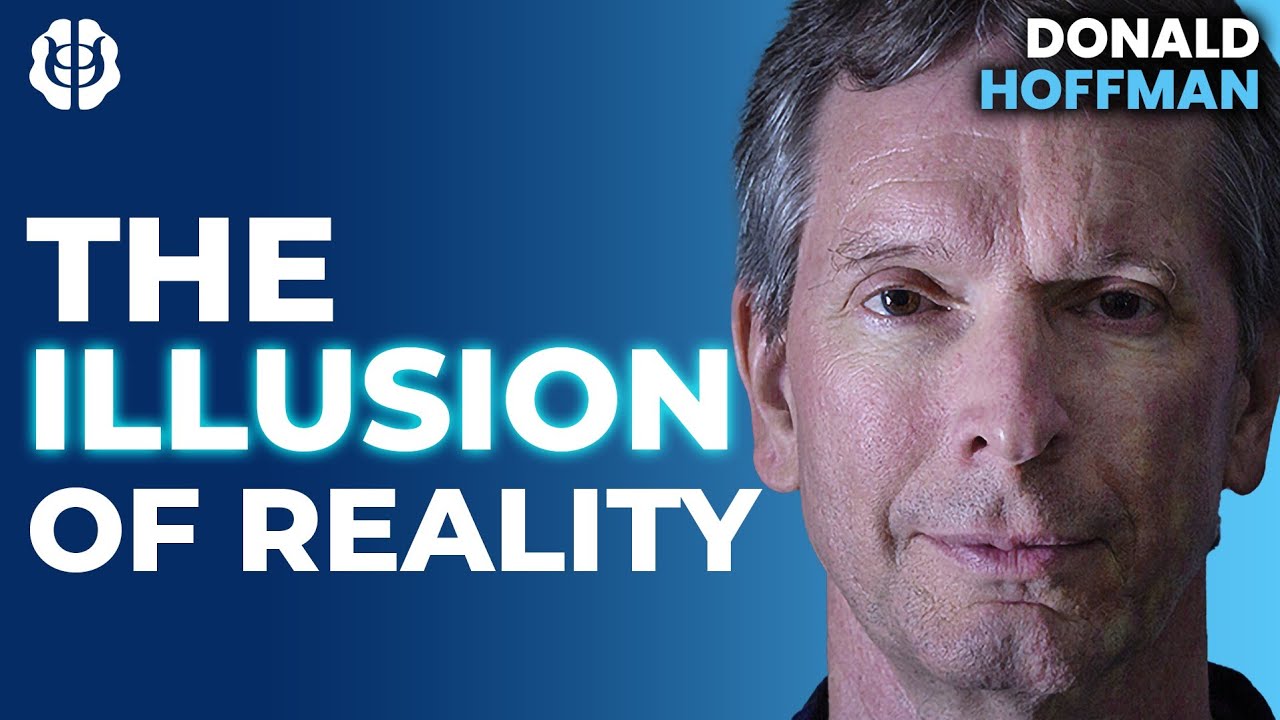The Case Against Reality: Interface Theory of Perception

Welcome back to the blog! In this post, we're diving deep into the fascinating and mind-bending world of Donald Hoffman's "The Case Against Reality." This book, and the theories it presents, challenges our fundamental understanding of what reality is and how we perceive it. Hoffman argues that evolution has shaped our perceptions not to show us the truth, but to maximize our survival. This has profound implications for everything from our understanding of space and time to our moral compass. We unpack the core concepts from the book, exploring the science and philosophical arguments that underpin Hoffman's Interface Theory of Perception and Conscious Realism. And if you want to go even further down the rabbit hole, be sure to check out our latest podcast episode, Donald Hoffman: Is Reality An Illusion? Interface Theory of Perception & Conscious Realism, where we had the pleasure of speaking with Donald Hoffman himself about these concepts. Now, let's get started and unravel this complex and fascinating theory!
Who is Donald Hoffman?
Donald Hoffman is a Professor Emeritus of Cognitive Sciences at the University of California, Irvine. He earned his BA in Quantitative Psychology from UCLA and his PhD in Computational Psychology from MIT. With over 120 scientific papers and three books to his name, including the thought-provoking "The Case Against Reality: Why Evolution Hid the Truth from Our Eyes," Hoffman has established himself as a leading figure in the study of consciousness and perception. He has also been a guest lecturer at the Zentrum für interdisziplinäre Forschung at Universität Bielefeld in Germany and has received awards from numerous prestigious organizations, including the American Psychological Association and the National Academy of Sciences.
Psychophysics: How We Perceive the World
Psychophysics is the branch of psychology that studies the relationship between physical stimuli and the sensations and perceptions they evoke. It seeks to quantify the subjective experience of the world by measuring the minimum intensity of a stimulus needed for detection (absolute threshold) and the smallest detectable difference between two stimuli (difference threshold). Historically, psychophysics has provided fundamental insights into how our sensory systems process information and transform physical energy into perceptual experiences.
Hoffman's work builds upon these foundations by questioning whether our perceptions are veridical representations of an objective reality. He suggests that our senses are not designed to provide us with an accurate picture of the world, but rather to guide adaptive behavior. This challenges the intuitive notion that our perceptions are a faithful reflection of reality.
Evolution and the Prioritization of Survival over Truth
The cornerstone of Hoffman's argument lies in the principle of natural selection. Evolution, he posits, favors strategies that enhance survival and reproduction, not necessarily those that accurately reflect reality. This is because accurate perceptions can be computationally expensive and may not always translate into adaptive advantages. Organisms that prioritize speed and efficiency in decision-making, even if it means sacrificing accuracy, are more likely to survive and pass on their genes.
Consider, for instance, the example of camouflage. Animals that blend into their surroundings are more likely to avoid predators, even if their perception of the environment is not entirely accurate. Similarly, the ability to quickly detect and respond to threats is often more important than precisely identifying the nature of the threat. Therefore, evolution might favor perceptual systems that are biased towards detecting potential dangers, even if it means generating false alarms.
Fitness Payoff Functions and Homomorphisms
Hoffman uses the concept of fitness payoff functions to formalize the relationship between perception and survival. A fitness payoff function maps an organism's actions in a given environment to its reproductive success. The goal of evolution is to optimize this function, meaning that organisms should evolve to behave in ways that maximize their chances of survival and reproduction.
He also introduces the idea of homomorphisms, mathematical structures that preserve relationships between different systems. In the context of perception, a homomorphism would exist if the structure of our perceptual experiences accurately reflected the structure of the underlying reality. However, Hoffman argues that evolution does not necessarily lead to homomorphisms. Instead, it favors perceptual systems that are isomorphic to the fitness payoff function, meaning that they are structured to optimize survival, even if it means distorting reality.
Space-Time: A User Interface?
One of the most radical claims in "The Case Against Reality" is that space and time are not fundamental aspects of reality but rather a user interface, similar to the desktop of a computer. Just as the icons on a desktop are not the actual files and programs but rather a simplified representation that allows us to interact with the underlying software, Hoffman argues that space and time are a simplified representation that allows us to interact with the underlying reality.
This idea challenges our intuitive understanding of the world as existing in a fixed and objective space-time framework. Instead, Hoffman suggests that space and time are constructs of our perceptual systems, designed to make the world more manageable and predictable. This allows us to navigate our environment and interact with objects in a way that promotes survival.
The Interface Theory of Perception (ITP)
The Interface Theory of Perception (ITP) is Hoffman's formal theory of how perception works. It proposes that our perceptual experiences are not a window onto reality but rather an interface that hides the true nature of the world. According to ITP, our senses provide us with simplified and stylized representations of the world that are optimized for action and survival.
This theory predicts that we should not expect our perceptions to accurately reflect the underlying reality. Instead, we should expect them to be shaped by our evolutionary history and our specific needs as organisms. This has profound implications for how we understand the nature of consciousness and the relationship between mind and matter.
Conscious Realism and Conscious Agents (CA) Theory
To explain the nature of the reality behind the interface, Hoffman proposes the theory of Conscious Realism (CA). CA posits that consciousness is fundamental and that the universe is composed of a network of interacting conscious agents. These agents are not necessarily human-like; they can be any entity capable of experiencing and acting on the world.
According to CA, space and time are not fundamental but are rather emergent properties of the interactions between conscious agents. The world we perceive is a shared construction of these agents, a kind of collective hallucination that allows us to interact with each other and with the environment. This theory offers a radical alternative to traditional materialism, which posits that matter is fundamental and that consciousness is an emergent property of complex systems.
Implications for Morals and Meaning-Making
If reality is not what we think it is, what does this mean for our morals and our sense of meaning? Hoffman argues that ITP and CA can provide a new foundation for ethics and meaning-making. If consciousness is fundamental, then our actions have real consequences in the realm of experience. This means that we have a moral responsibility to treat each other and the world with respect and compassion.
Furthermore, if the world is a shared construction of conscious agents, then we have the power to shape it for the better. By cultivating positive experiences and promoting understanding and cooperation, we can create a more meaningful and fulfilling world for ourselves and for others.
Markovian Dynamics, Entropy, and Time
Hoffman's theory also delves into the nature of time, suggesting it's not a linear progression but rather a consequence of Markovian dynamics. Markovian dynamics refers to a system where the future state depends only on the current state, not on the past. He connects this to entropy, the measure of disorder, arguing that the perception of time's arrow is related to the increase of entropy within our interface.
In essence, our experience of time is a simplified construct that helps us navigate a reality far more complex than we perceive. This perspective challenges our intuitive understanding of cause and effect and opens up new avenues for exploring the relationship between consciousness and the physical world.
Universal Darwinism and its Role
Hoffman extends the concept of Darwinism beyond biological evolution to a more universal principle. Universal Darwinism suggests that any system with variation, selection, and inheritance will inevitably evolve. In the context of Conscious Realism, this implies that the network of conscious agents is constantly evolving, with agents that are more successful at interacting and cooperating becoming more prevalent.
This perspective provides a dynamic and adaptive framework for understanding the nature of reality. It suggests that the universe is not a static and unchanging entity but rather a constantly evolving system of conscious agents. It also offers a potential explanation for the emergence of complexity and intelligence in the universe.
Gödel's Incompleteness Theorems
Hoffman draws on Gödel's incompleteness theorems to further support his argument that our perceptions are incomplete representations of reality. Gödel's theorems demonstrate that any formal system that is complex enough to describe basic arithmetic will necessarily contain statements that are true but cannot be proven within the system itself.
This implies that there will always be aspects of reality that are beyond our comprehension, no matter how sophisticated our scientific theories become. It also suggests that our perceptions are necessarily limited and incomplete, and that we should be cautious about drawing definitive conclusions about the nature of reality.
The Notion of Life, the Self, and Neuroscience
Hoffman's ideas also have implications for our understanding of life, the self, and neuroscience. If consciousness is fundamental, then life may not be limited to biological organisms but could potentially exist in other forms as well. The self, according to CA, is not a fixed and unchanging entity but rather a dynamic collection of conscious agents.
Neuroscience, from this perspective, is not about discovering the neural correlates of consciousness but rather about understanding how the brain mediates the interactions between conscious agents and the interface. This challenges the traditional view that the brain is the source of consciousness and opens up new avenues for exploring the relationship between mind and brain.
Donald Hoffman's Recommendations
In our conversation, Donald Hoffman shared some recommendations for further reading and exploration of these topics. These recommendations offer valuable insights into the philosophical and scientific foundations of his theories. You can find a list of his books and publications in the show notes for the related podcast episode.
Hoffman's Views on Religion
Finally, Hoffman addresses the relationship between his theories and religion. He argues that Conscious Realism is not necessarily incompatible with religious beliefs, but rather offers a new perspective on the nature of God and the universe. If consciousness is fundamental, then God could be understood as the ultimate conscious agent, the source of all being and experience.
This perspective challenges traditional theological concepts but also offers a potential bridge between science and religion. It suggests that both science and religion are ultimately concerned with the nature of reality and the human condition, and that they can both contribute to our understanding of the world.
Conclusion: Challenging Our Perceptions
Donald Hoffman's "The Case Against Reality" presents a profound challenge to our conventional understanding of the world. By arguing that evolution has shaped our perceptions to prioritize survival over truth, he compels us to reconsider the nature of reality and our place within it. The Interface Theory of Perception and Conscious Realism offer a radical alternative to traditional materialism, suggesting that consciousness is fundamental and that the universe is a network of interacting conscious agents.
Whether you agree with Hoffman's conclusions or not, his work is sure to provoke thought and inspire new avenues of inquiry. By questioning our assumptions and challenging our perceptions, we can gain a deeper understanding of ourselves and the world around us. And if you found this exploration intriguing, be sure to listen to our full conversation with Donald Hoffman in our podcast episode, Donald Hoffman: Is Reality An Illusion? Interface Theory of Perception & Conscious Realism. Thanks for joining us on this journey into the nature of reality!








